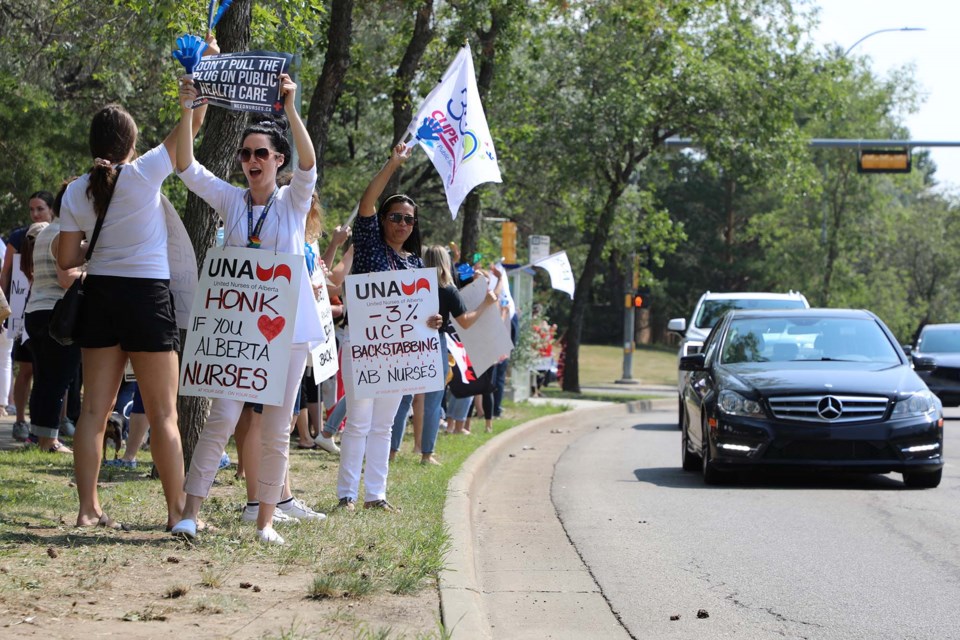Local nurses are relieved to have ironed out a collective agreement with the province after months of negotiations.
Orissa Shima, a nurse at the Sturgeon Community Hospital and president of the local nurses' union, said nurses are happy to end bargaining with their employer.
Shima, who was on the negotiating committee, said she had to stay mum on the developments during the process and is happy to take the deal to the rest of the nurses.
The deal was announced on Wednesday and since then Shima said she has received a lot of good feedback from members.
“I'm feeling relieved. It still doesn’t necessary show what we are worth after everything nurses have been through, through the course of the pandemic,” Shima said.
“It's not everything we're worth, but I think for most of us, it's satisfactory.”
The deal, which was reached with the help of a mediator, will see nurses get a 4.25-per-cent wage increase through a contract that retroactively stretches from April 1, 2020, to March 31, 2024. Pay increases were not slated to kick in until this fall, so most nurses won’t receive much in the way of retroactive pay increases.
In August, the nurses and the province were so far apart in their bargaining that the United Nurses of Alberta union (UNA) said a strike was nearly inevitable.
The UNA had agreed on conditions for essential services in August, which are the conditions in the health-care system that must be upheld during a strike, bringing the province's 30,000 nurses one step closer to a strike.
At the time the nurses were asking for a two-per-cent salary increase per year of the contract, along with a request that Alberta Health Services and the provincial government reveal publicly how much overtime is being used on each unit per year.
The employer was asking for a three-per-cent cut to salaries, with a two-per-cent cut to the lump-sum payment nurses receive, which equals a five-per-cent reduction in their income.
On top of cutting salaries, working conditions would be made worse, Harrigan said, by removing the requirement to have a registered nurse or registered psychiatric nurse in charge of nursing units, which will deeply impact patient care.
“It's going to affect working conditions if you have a nursing unit and there's no nurse in charge, things can really go awry,” UNA director of labour relations David Harrigan said in the summer.
Shima said it has been difficult to be a nurse during the pandemic while also being in wage negotiations with their employer.
“Most members that I'm hearing from are relieved and looking forward to just putting this chapter behind them,” Shima said.
Nurses are set to take part in a ratification vote on the deal on Jan. 17.
The nurses' union is happy about improvements, including enhanced psychological supports; creation of a union-employer provincial workload advisory committee; and implementation of a Rural Capacity Investment Fund. The fund will allocate $5 million a year to recruitment and retention strategies in rural and remote areas of the province, and $2.5 million a year for relocation assistance.
“This agreement recognizes the hard work and sacrifices of Alberta’s registered nurses and registered psychiatric nurses throughout the pandemic,” UNA president Heather Smith said in a press release.
“Our members and their colleagues have been holding Alberta’s health-care system together, and it is a relief to have reached an agreement with the assistance of the government-appointed mediator.”
In the email release, UNA labour relations director David Harrigan, who led the negotiating committee in collective bargaining and mediation, said this round of negotiations has been the most difficult in his more than three decades with the union.
“We are glad Alberta Health Services was prepared to move away from its initial demands for wage cuts and to drop its efforts to impose more than 200 rollbacks,” Harrigan said.
“The bargaining committee feels strongly this agreement will benefit all UNA members and also be fair to the people of Alberta.



